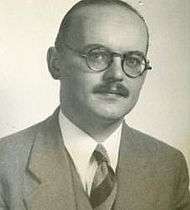Peter A. Boodberg
| Peter A. Boodberg | |||||||||||
|---|---|---|---|---|---|---|---|---|---|---|---|
|
Peter Boodberg (c. 1938) | |||||||||||
| Native name | Пётр Алексеевич фон Будберг | ||||||||||
| Born |
8 April 1903 Vladivostok, Russian Empire | ||||||||||
| Died |
29 June 1972 (aged 69) Berkeley, California, United States | ||||||||||
| Nationality | Russian, Baltic German | ||||||||||
| Fields | Chinese language, history; Altaic languages | ||||||||||
| Institutions | University of California, Berkeley | ||||||||||
| Alma mater | University of California, Berkeley | ||||||||||
| Notable students | William Boltz, Richard Mather, Edward Schafer, Fr. Paul Serruys | ||||||||||
| Chinese name | |||||||||||
| Chinese | 卜弼德 | ||||||||||
| |||||||||||
Peter Alexis Boodberg (born Pyotr Alekseyevich von Budberg; 8 April 1903 – 29 June 1972) was a Russian-American scholar, linguist, and sinologist who taught at the University of California, Berkeley for 40 years. Boodberg was influential in 20th century developments in the studies of the development of Chinese characters, Chinese philology, and Chinese historical phonology.
Life
Peter Alexis Boodberg was born "Pyotr Alekseyevich von Budberg" (Russian: Пётр Алексеевич фон Будберг) on 8 April 1903 in Vladivostok, Russia, which was then still a part of the Russian Empire. The Boodbergs were a Baltic German family, originally from Mainz, that had lived in Estonia since the 13th century. After Russia annexed Estonia in 1721, they became a prominent diplomatic and military family in Imperial Russia. Boodberg's father, Baron Alexis von Budberg (1869–1945), was a nobleman and commanding general of the Russian forces in Vladivostok. His father's position ensured that Boodberg enjoyed a strong education in the Latin and Greek Classics and in the major European languages.[1] Boodberg was a cadet at a military academy in St. Petersburg until the outbreak of World War I, when Boodberg's parents sent him and his brother to Harbin, Manchuria, out of concern for their safety.[1] Boodberg attended the Oriental Institute (modern Far Eastern Federal University) in Vladivostok, where he studied Chinese, which he had begun learning as a teenager in Harbin, and learned several other Asiatic languages.[1]
The Boodberg family fled Russia in 1920 due to the anti-aristocracy violence of the Bolshevik Revolution.[1] The family emigrated to the United States, settling in San Francisco.[1] Boodberg enrolled as a student at the University of California, Berkeley, graduating with a B.A. in Oriental Languages in 1924.[1] Boodberg continued studying at Berkeley as a graduate student, earning a Ph.D. in Oriental Languages in 1930 with a dissertation entitled "The Art of War in Ancient China: A Study Based on the Dialogues of Li, Duke of Wei."[2]
In 1932, Boodberg was hired to teach at Berkeley as an instructor in the Oriental Languages department. He was made an associate professor in 1937, Chairman of the department in 1940, and was promoted to full professor in 1948. Boodberg's scholarship won him Guggenheim Fellowships in 1938, 1956, and 1963. In 1963, Boodberg also became President of the American Oriental Society. He continued to teach until his death from a heart attack in 1972. Boodberg influenced several generations of sinologists, notably Edward H. Schafer, who wrote a long obituary article in the Journal of the American Oriental Society that was followed by a full bibliography by Alvin P. Cohen.
Selected works
Boodberg authored a large number of studies and manuscripts that—for reasons that are not entirely clear—he did not publish publicly, but rather self-published and circulated mostly among his students and close colleagues. Additionally, he seems to have destroyed several manuscripts he had written relating to philology and Chinese frontier history in the years prior to his death.[3] The following are some of his better known publicly published works.
- Boodberg, Peter A. (1930). "The Art of War in Ancient China: A Study Based Upon the Dialogues of Li, Duke of Wei". Ph.D. dissertation (University of California, Berkeley).
- ——— (1936). "The Language of the T'o-ba Wei". Harvard Journal of Asiatic Studies. 1: 167–85. doi:10.2307/2717850.
- ——— (1937). "Some Proleptical Remarks on the Evolution of Archaic Chinese". Harvard Journal of Asiatic Studies. 2: 329–72. doi:10.2307/2717943.
- ——— (1938). "Marginalia to the Histories of the Northern Dynasties". Harvard Journal of Asiatic Studies. 3: 223–53. doi:10.2307/2717838.
- ——— (1940). "'Ideography' or Iconolatry?". T'oung Pao. 35 (4): 266–88.
- ——— (1943). Exercises in Chinese Parallelism. Berkeley: University of California Press.
- ———; Chen, Shih-Hsiang (1948). Twenty-five Chinese Quatrains, with Vocabulary Exercises. Berkeley: University of California Press.
- ——— (1951). Introduction to Classical Chinese. Berkeley: University of California Press.
- ——— (1957). "Philological Notes on Chapter One of the Lao-tzu". Harvard Journal of Asiatic Studies. 20: 598–618. doi:10.2307/2718364.
- Cohen, Alvin P., ed. (1979). Selected Works of Peter A. Boodberg. Berkeley: University of California Press.
See also
References
- Footnotes
- 1 2 3 4 5 6 Honey (2001), p. 288.
- ↑ Schafer (1974), p. 1.
- ↑ Cohen (1974), p. 12.
- Works cited
- Cohen, Alvin P. (1974). "Bibliography of Peter A. Boodberg". Journal of the American Oriental Society. 94 (1): 8–13. JSTOR 599725.
- Honey, David B. (2001). Incense at the Altar: Pioneering Sinologists and the Development of Classical Chinese Philology. American Oriental Series. 86. New Haven, Connecticut: American Oriental Society. ISBN 0-940490-16-1.
- Schafer, Edward H. (1974). "Peter A. Boodberg, 1903–1972". Journal of the American Oriental Society. 94 (1): 1–7. JSTOR 599725.
